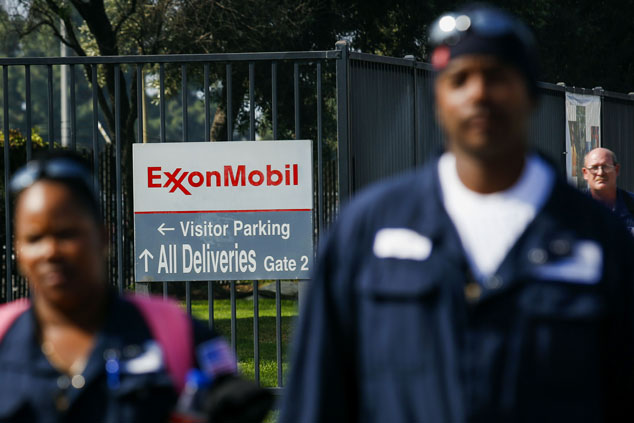
This article is taken from our FREE daily investment email Money Morning.
Every day, MoneyWeek’s executive editor John Stepek and guest contributors explain how current economic and political developments are affecting the markets and your wealth, and give you pointers on how you can profit.
A gentle reminder to MoneyWeek magazine subscribers before we start – if you haven’t yet booked your ticket for the Wealth Summit on 22 November, then take 15 minutes to do so now. Tickets are selling fast, and your discount code (which came with the 13 September issue) does have a deadline on it! Book here.
I want to return to the topic of oil this morning.
Obviously the biggest news on oil in recent weeks has been the attack on the Saudi processing facilities.
But today I want to focus on a rather less dramatic event that occurred at the end of last month.
It didn’t involve any drones or geopolitical tension.
But it might have rather more long-term significance for investors.
Oil has had a huge fall from grace
Exxon Mobil is one of the world’s largest oil companies. It is a direct descendant of John Rockefeller’s Standard Oil, and it’s been listed on the US stockmarket in one form or another since the 1920s.
In all that time, it has always occupied a slot in the top ten US stocks by market capitalisation. That is, until last month.
Last month, Exxon Mobil – which as recently as 2009, was the biggest stock in the S&P 500 –fell out of the top ten in the end-of-month roundup, to sit at number 12.
The top ten is now mostly dominated by tech stocks: Microsoft is at number one, with Apple, Amazon, Facebook and Google close behind. Others in the top ten include Warren Buffett vehicle Berkshire Hathaway, JP Morgan Chase, Johnson & Johnson and Visa.
This fall from grace is not specific to Exxon. The US energy sector as a whole now counts for less than 5% of the S&P 500’s market cap. A decade ago, it accounted for almost 12%. And it’s the lowest weighting for the sector in at least 40 years.
That’s pretty striking. As regular readers will know, I’m always on the lookout for contrarian indicators (I’ve literally written a book on contrarian investing), and I have to say, these two have caught my attention.
I’m not saying for a minute that there aren’t good reasons for oil to be less popular now than in 2009. In 2009, oil and resources stocks were among the few to be relatively immune to the collapse of the financial sector.
China’s big stimulus package in late 2008 saw the resources sector in general bottom out in November 2008 and then rocket higher for another two and a half years or so, before hitting a wall in May 2011.
There was then a major bear market first in commodities, and eventually in oil (around 2014). This bear market arguably ended in 2016, but hasn’t really resulted in a high-conviction bull market to replace it.
So it’s perfectly understandable that energy stocks would be less popular today than ten years ago. But to have declined so far in relative terms suggests that something more dramatic is going on.
Could Saudi Aramco’s IPO mark the bottom (for the oil market)?
Sentiment wise, investors are certainly turning against oil and resources in general. The rise of ESG investing (the new incarnation of ethical or green investing) has had an impact on that front.
The argument here is that oil companies and the like run the risk of ending up with “stranded assets” – in other words, tighter regulations and taxes around carbon emissions will lead to companies being either banned from extracting and producing oil and other polluting resources, or for it to cost so much to do so that it’s not worth doing.
A linked but perhaps more potent argument is that we’ve reached “peak oil demand”. This is the reverse of the “peak oil” theory that proliferated in the first decade of this millennium. “Peak oil” argued that we were running out of oil (or at least, cheap oil).
Peak oil demand, by contrast, argues that demand is going to drop off a cliff. And so there’s no danger we’ll run out of oil because we soon won’t need it. The main argument for this is that electric cars will replace petrol cars, and thus eliminate a huge source of demand for oil altogether.
All of this can be true. The question though is: is it in the price? And in fact, does it mean that oil and resources stocks are maybe a little bit underpriced, given that we still use an awful lot of hydrocarbons and the idea that we’re going to all be driving electric cars imminently still seems a touch ambitious?
I suspect that there might be an opportunity here. I also find it interesting that the Saudis are very keen to start selling off their national oil company, Saudi Aramco.
The idea is that they need to diversify their economy (which is sensible). But diversifying by switching out of unfashionable “real assets” that still generate profits, and sticking the money into SoftBank’s “Vision Fund” which funds fashionable pseudo-tech companies that generate nothing but massive losses, does not necessarily seem like sensible diversification.
Instead it seems a bit like flogging off the goose that lays the golden eggs because it’s looking a little bit peaky, then spending that money on a tub full of magic beans because the salesman has a fantastic spiel.
Often an IPO marks the top of a bull market. But I wonder if the Aramco IPO (assuming it gets away) might mark the bottom of a bear market in sentiment towards oil?
One to watch. And in the meantime, have a read of Merryn’s piece on oil stocks here.